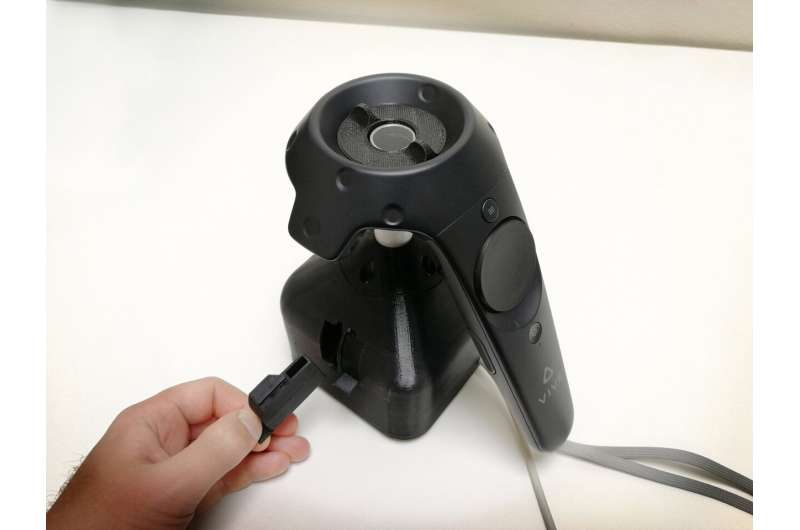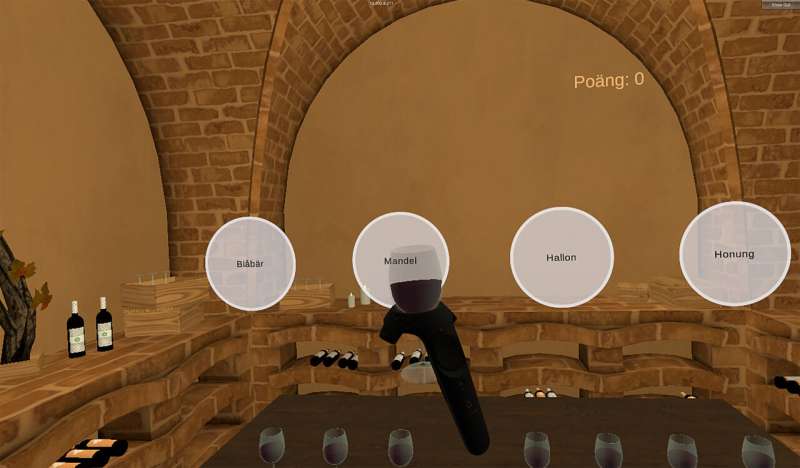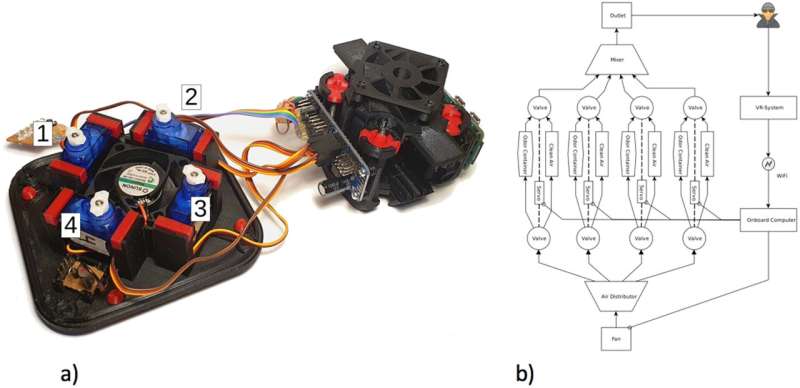Smelling in VR environment possible with new gaming technology
An odor machine, so-called olfactometer, makes it possible to smell in VR environments. First up is a “wine tasting game” where the user smells wine in a virtual wine cellar and gets points if the guess on aromas in each wine is correct. The new technology that can be printed on 3D printers has been developed in collaboration between Stockholm University and Malmö University. The research was recently published in the International Journal of Human–Computer Studies.
“We hope that the new technical possibilities will lead to scents having a more important role in game development,” says Jonas Olofsson, professor of psychology and leader of the research project at Stockholm University.
In the past, computer games have focused mostly on what we can see—moving images on screens. Other senses have not been present. But an interdisciplinary research group at Stockholm University and Malmö University has now constructed a scent machine that can be controlled by a gaming computer. In the game, the participant moves in a virtual wine cellar, picking up virtual wine glasses containing different types of wine, guessing the aromas. The small scent machine is attached to the VR system’s controller, and when the player lifts the glass, it releases a scent.
“The possibility to move on from a passive to a more active sense of smell in the game world paves the way for the development of completely new smell-based game mechanics based on the players’ movements and judgments,” says Simon Niedenthal, interaction and game researcher at Malmö University.

The olfactometer consists of four different valves each connected to a channel. In the middle there is a fan sucking the air into a tube. With the help of the computer, the player can control the four channels so that they open to different degrees and provide different mixtures of scent. Scent blends that can mimic the complexity of a real wine glass. The game has different levels of difficulty with increasing levels of complexity.
“In the same way that a normal computer game becomes more difficult the better the player becomes; the scent game can also challenge players who already have a sensitive nose. This means that the scent machine can even be used to train wine tasters or perfumers,” says Jonas Olofsson.
All code, blueprints and instructions for the machine are openly available online, as is code for the virtual wine tasting game. The research group, Sensory Cognitive Interaction Laboratory, which is located at the Department of Psychology, Stockholm University, now hopes that scented computer games can become useful for other purposes.
“For those who, for example, lost their sense of smell after COVID-19 or for other reasons, the new technology can mean an opportunity to regain their sense of smell with the help of game-based training,” says Jonas Olofsson, research team leader.

Smell training is a method recommended by doctors for those who lose their sense of smell after colds and other viruses, but according to Jonas Olofsson, many people stop training because it becomes too boring.
“I hope that the fact that drawings and code are openly available as ‘open source’ will lead to an opportunity for game companies to start creating new, commercial products for scent training using the new technology,” says Jonas Olofsson.
According to Simon Niedenthal, “open source” leads to promoting accessibility, reproducibility and comparison of results in research. It also contributes to creating a cohesive research and design community within the game development field.
“But it also means that the costs of the equipment are greatly reduced, which makes it available to more people. To us that is important,” says Simon Niedenthal.

“We believe in open science, that research results should be made available to the public and that other researchers should be able to repeat our results. With the help of our research, others can build scent machines and explore new ways of using scents in games,” says Jonas Olofsson.
The technology for the olfactometer has been developed by Peter Lundén, research engineer at Stockholm University and member of the research team at SCI LAB.
Simon Niedenthal et al, A graspable olfactory display for virtual reality, International Journal of Human-Computer Studies (2022). DOI: 10.1016/j.ijhcs.2022.102928
Citation:
Smelling in VR environment possible with new gaming technology (2022, October 13)
retrieved 13 October 2022
from https://techxplore.com/news/2022-10-vr-environment-gaming-technology.html
This document is subject to copyright. Apart from any fair dealing for the purpose of private study or research, no
part may be reproduced without the written permission. The content is provided for information purposes only.
For all the latest Technology News Click Here
For the latest news and updates, follow us on Google News.
